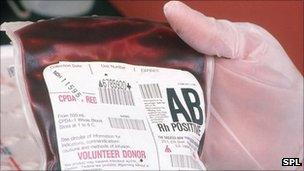Gay blood ban change 'not enough', say Lib Dems
- Published

Gay men will be allowed to donate blood but only after a 12 month deferral period
Liberal Democrats have urged the government to go further in removing the ban on gay men donating blood.
The party conference says a decision this month to lift the lifetime ban - but replace it with a 12 month deferral period - is "a ban by any other name".
The vote was carried although it is not binding on the Lib Dem leadership.
Restrictions were introduced in the 1980s over fears of HIV contamination but had been questioned on both ethical and medical grounds.
Ministers in England, Scotland and Wales have accepted medical advice, that a full ban is not justified.
Safe sex
But men who have had sex with men in the past 12 months will still not be allowed to give blood.
The debate heard that the deferral period effectively meant that sexually active gay men were being equated to men who had sex with prostitutes, and those who have had sex in countries where HIV/Aids is very common.
Lib Dem member Dij Davies, who was prevented from donating blood to his mother when she needed a transfusion because he was gay, told the conference there was no reason why men who practised safe sex, should be prevented from giving blood.
He said the 12-month deferral period was "simply a ban by any other name".
"It stigmatises male same sex contact by perpetuating the myth they can't be trusted in matters of sexual health," he said.
'Not gay disease'
Another party member, Ross Pepper, said the new rules were still an example of "institutionalised homophobia", pointing out that thousands of people had contracted HIV through heterosexual sex.
"It's not just a gay disease," he said.
And Dave Page, a party member from Manchester, told delegates the 12 month deferral period was "not scientific".
"It's not taking into account what is risky sex and what is not," he said.
An announcement was made earlier this month that the full ban on men who have had sex with men ever giving blood would be lifted.
It had been introduced in response to the Aids epidemic and lack of adequate HIV tests in the early 1980s.
But it had been questioned on ethical and medical grounds and was subject to a review by the government's advisory committee on the safety of blood, tissue and organs.
The National Blood Service screens all donations for HIV and other infections but there is a "window period" after infection during which it is impossible to detect the virus.
The advisory committee said advances in testing had reduced the size of the window period and the chance of errors, so the evidence no longer supported the need for a full ban.
The findings were accepted by health ministers and a one-year ban will come into force in England, Scotland and Wales on 7 November.
A spokesman for the Department of Health said: "The 12-month deferral reflects the heightened risk of sexually active men who have had sex with men from blood-borne viruses.
"At a population level, figures show HIV levels remain at one in 20 in this community compared with one in 1,000 in the heterosexual community.
"The window of time when new infections with hepatitis B can remain undetected and its prevalence were also instrumental in [committee's] recommendation."
- Published19 September 2011
- Published18 September 2011
- Published17 September 2011
- Published17 September 2011